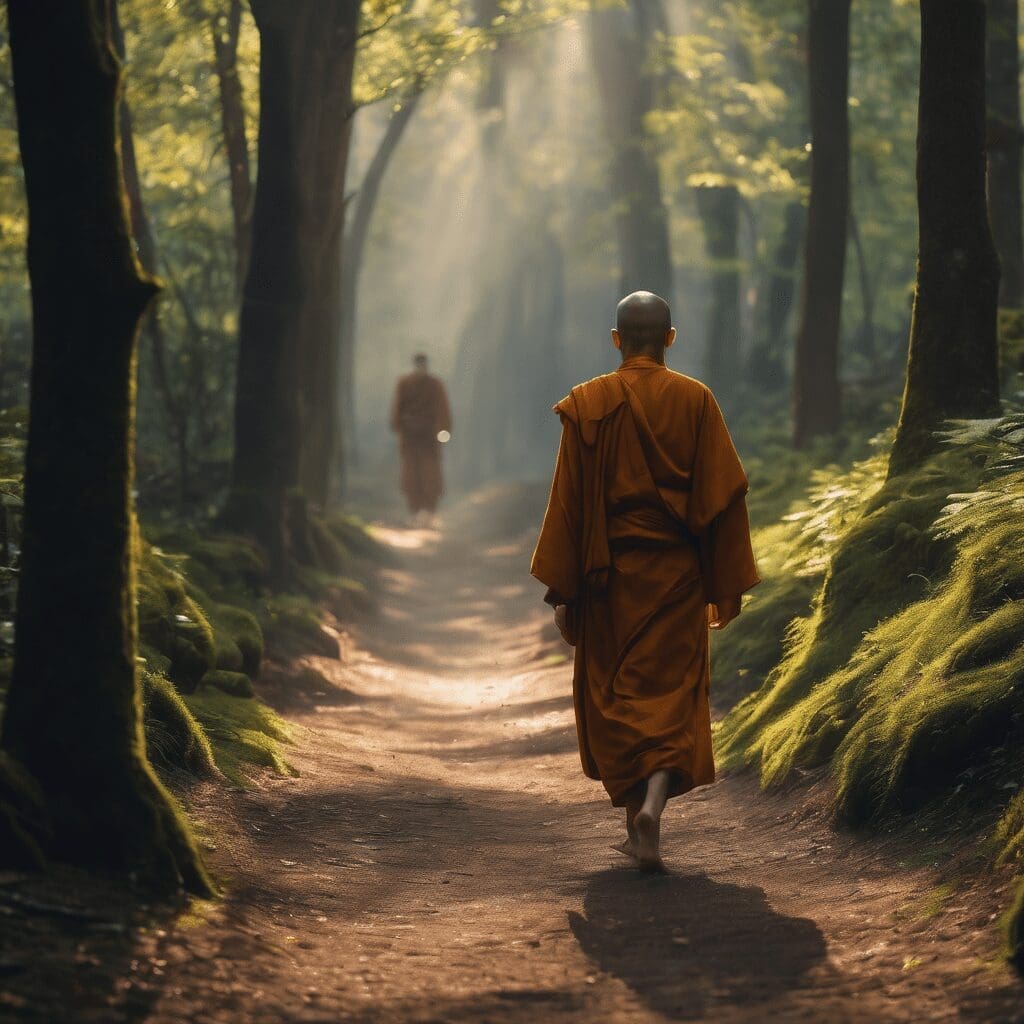- Home
- /
- Here are some of...
- /
- Blogs
- /
- Karma
- /
- About Karma
- /
- Meaning of Karma in...
Who hasn’t heard of the word “karma”? – Nowadays it has become a common word not only in India but all over the world! However, when you investigate further, you will discover that no one is in complete agreement on what this word “karma” means.
Do we ever really understand what this means?
To understand karma in its proper perspective, it is necessary to understand our true nature. Ramana Maharishi’s “Who am I?” approach is the best way to approach this. In fact, all spiritual texts should be understood from this perspective – Otherwise, we may not be able to understand it correctly.
What is this correct perspective?
While reading spiritual texts, we should refrain from identifying ourselves with our body. Rather, we should approach these books in the understanding that we are “pure souls” born as “humans” in this body.
With this proper perspective in place, let us try to understand Karma better.
Spiritual texts like Yoga Vasishta, Bhagavad Gita and Bhagavata say that any action we do without realizing our true nature (as pure souls) results in “karma”. This means that the actions we do without realizing our true nature create “karma”.
Until we realize our true nature, this “karma” binds us and keeps us in the vicious cycle of births and deaths!
Jnani – Action with no karma?
He who realizes his true nature every moment and can always distinguish himself from his body is called a “Jnani”. The actions of such realized souls do not bind them to karma. Jnanis live like water droplets on a lotus leaf.

They may live as one among us, but they would not accumulate any karma! These realized souls are neither subject to “death” nor to “birth”!
In the Shiva Purana, Manickavasakar, best described as the epitome of devotion, elaborates on this state.
According to Yoga Vasishtam and many other scriptures, our true nature is like “Kalpa Vriksha” (wish-fulfilling tree) or “Kamadhenu” (cow that grants any wish instantly). In our true nature, our thoughts materialize immediately!
Just as a clean mirror instantly reflects the objects in front of it, our true nature instantly fulfills our desires! This happens only when real realization takes place, not just a superficial understanding of ourselves!
But, wait a minute! If we our thoughts materialize instantly, isn’t that a recipe for disaster? This is why the gurus of the past did not reveal the secret of true nature to everyone. Only when they were sure that their disciples were ready for it did they select their disciples and impart the true knowledge to them!
What constitutes Karma?
But what actions constitute karma? And what kind of actions create which kind of karma? Is there something called “good karma” and “bad karma”?
Well, in order to answer this, shall we once again return to the correct perspective? Who are we? We are pure souls! If we understand from this perspective, would we get bound by karma in the first place? Then, what is good karma and bad karma?
To understand this further, we need a deeper understanding of our nature. We are all pure souls, no doubt. But the scriptures declare that there are seven layers (sheaths) of “bodies” that contain our true spiritual nature (Let’s reserve a more in-depth discussion on this to another day…). Our body (Annamaya Kosha – sheath made of food) is the external gross body that we see outwardly. The other koshas are not visible to the eye.
However, we are deeply connected by a common “consciousness” called “Brahman” – when we reach this stage of realizing “we are Brahman” or “we are Absolute Consciousness”, we realize that we are not separate. We are all, in fact, one! “Advaita” declares that our true nature is “non-dual” – meaning that we are not separate souls, but one soul in totality!
The Secret of Karma
If we do not realize and experience our oneness, all our actions create karma. Karma is bound to exist as long as we continue to deviate from the oneness and see the world as “you” and “me”, “this” and “that”, “theirs” and “ours”, etc. Once we realize our true nature, we experience oneness in every moment, so no karma arises. This is the secret of karma.
The famous Telugu poet Sri Annamacharya presents this concept in a simple and beautiful poem – BrahmaOkate. The video below of the cute kids – Suryagayathri & Rahul Vella is absolutely fascinating – worth listening multiple times!
The simple rules of Karma
As a corollary – the simplest rule of Karma is:
You get back what you give!
All Hindu Holy Scriptures
You give love, you would get back love. Hate others and others would hate you as well. Love all, you would be loved by all. Help others, you would automatically receive help from others. Care for others, and you would get reciprocated, and that too when you most need the care. Simple!
Is it a coincidence that the Holy Bible also states the same differently?
And as you wish that others would do to you, do so to them
The Holy Bible
So, what next?
This simple rule is derived from the fact that we are indeed ONE. In childhood, we are all well connected to our true nature, thereby not generating much karma. However, as we grow older, we tend to slip away from our true nature and get accustomed more and more to our body and mind (which is shaped by our own senses).
Over time, we develop our own personality and have very strong likes and dislikes based on past and present karma. A “false ego” develops and begins to rule us. It creates so-called feelings of love (or hate) towards other people (and things) around us. Some sort of materialistic happiness and sadness naturally arise as a result, thereby generating more karma! Our thoughts reinforce our karma, our karma reinforces our thoughts, thereby creating an endless cycle!
Ultimately, we become what we think. Our actions, that creates karma, become imprinted in our future lives as our strengths and weaknesses. Aren’t we creating our own destiny? Isn’t it obvious that karma and destiny are linked to each other?
With this understanding shall we continue this discussion in the next post?
You are most welcome to voice your thoughts as comments below….
For knowing more about Pithru Dosha or Rahu Karma, click here
With Love, karumbu.in.
24 responses to “Meaning of Karma in simple words!”
-

Our thoughts reinforce our karma, our karma reinforces our thoughts, thereby creating an endless cycle! – amusing line.
Enjoyed reading this article. Looking to read more.
-

Thank you! Planning to post more often.
-
-

Thought itself is an action. So every thought also creates Karma.
Very good write up.-

Thank you!
-
-

Beautiful write up in lucid language.
Karma is a detailed subject about which scholars are even now explaining at difference levels
we control our actions, our emotions, our thoughts and arrange ourselves in the right way then we can manifest what we want. But even then we do not have control over how, or when things happen. We also have to bear the reactions to our past actions ( from this life itself, or our past ones). When that happens , all that matters is how we react now. We can either continue a vicious cycle of negative actions and reactions or simply suffer it and let it pass. If we focus on our actions and focus on goodness, then we would probably take the right action in the midst of trying circumstances. That is being concious, and evolved. No? And that is why karma theory says that we only have the right to action and not to the result-

Absolutely! Bang on! Yes, the only thing in our control is indeed the “action” we take to the circumstances & events that happen in our lives. Actions (or even thoughts) that is devoid of our ego, basically selfless thoughts, yield no karma. So do actions done without any expectations of results, as taught to Arjuna by Lord Krishna. It is a sure sign of evolution. In my subsequent posts, I would be touching upon these aspects as well. Thanks for pre-empting!
-

ஆழமான கருத்துக்கள்.
இன்றைய தலைமுறையினரின் கவனத்தை ஈர்க்க வேண்டும்.
-
-
-

True…In simple terms seeker – we , seer – Atman or holy spirit and scene – we as human beings and all other creatures remain one and the same…By Adhi Sankara in Adhvaita. Barricade is termed as karma. Hence neutralizing it is our challenge leading to thought less state which bless us the self realisation which is the very purpose of life…Hence accept the people as they are and nature is the only solution to our karma cleansing. Aham Brahmasmi 🙏
-

Wonderful explanation. Thanks for sharing!
-
-

Nandri
-

Everything we “do” is karma. There is no confusion there. Over thinking complicates matters and causes confusion. I try not to define everything, thereby get closer to reality! If we unlearn material association we stay spiritual, it’s as simple as that!
-

Great thanks!
-
-

Different light to show the creation of karma and remedy to dislove it, by ourselves in our reactions to others actions only. Salute u sir
-

Thank you!
-
-

தமிழில் தெரிவிக்கவும்
-

இணையதளத்தின் கீழே இடதுபுறத்தில் மிதக்கும் பொத்தானைப் பயன்படுத்தி தமிழ் மொழியைத் தேர்வு செய்யலாம்
-
-

Nice article on Karma. Thanks for sharing.
-

Thanks Sriram!
-
-

Karma explained in simple words. I liked the Brahmam Okate song which explains the concept of One Brahmam. This reminded me of,Shankara Bagavadpada’s saying ” Brahma Satyam, Jagan Mitya”. Looking forward to more such posts from you Dev.
-

Thanks Suresh, sure hoping to write more soon…
-


Leave a Reply